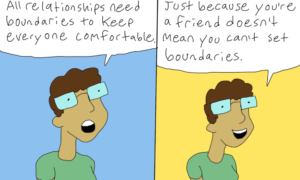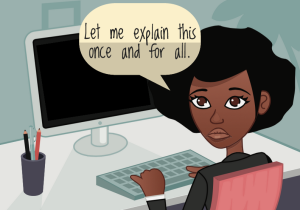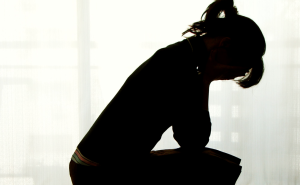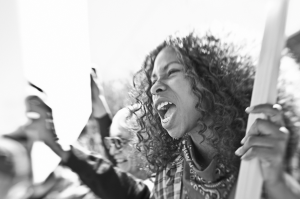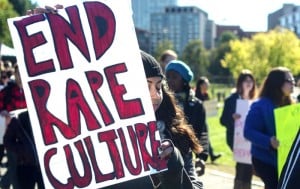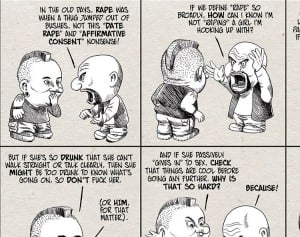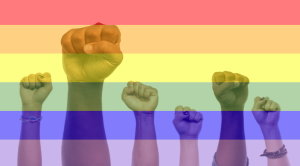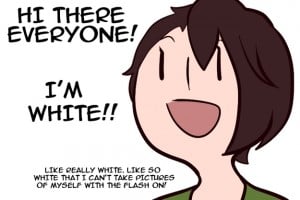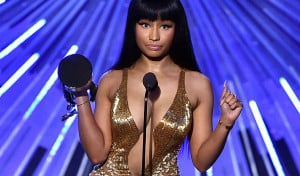
Source: CBS
While it’s true that Nicki Minaj has her own beef with Miley Cyrus, and also true that Nicki doesn’t actually know I exist, I can’t help but believe that when Nicki Minaj called Miley Cyrus out at the 2015 Video Music Awards, she did it just for me.
Because within just a few seconds, and with millions of people watching, Nicki sent the message that so many Black women want the world to know.
It is oppressive and unhelpful when people police the way we speak about our struggles.
It needs to stop.
Let’s look at what just happened at the VMAs and how it relates to the way our unique movements and our participation within the feminist community continuously get tone policed.
But First, What’s Tone Policing?
Tone policing – which takes up so much space in feminist movements these days – is when marginalized people speak up about our struggles, and people from more dominant groups focus not on what we said, but how we said it.
For example, think about how frequently people say “Calm down” or “Don’t be so angry” to Black women who call out racism – as if the way a person talks about the racism they’re experiencing is way more important than the actual racism they’re experiencing.
This usually happens because calling out racism makes the white person in question uncomfortable. They want to deflect the attention away from their racist actions and refocus on the person of color and how they’ve done something “wrong” for calling out racism – which feels a lot like victim-blaming.
Unfortunately, so many different oppressed groups have to encounter this. Every time they speak up for themselves.
But it’s no coincidence that it so frequently happens to Black women. It’s related to some much bigger issues around white supremacy and misogynoir, the implicit and explicit societal hatred of Black women.
So in the spirit of Nicki Minaj’s righteous passion, I’d like to take a much-needed moment to stand up for Black women’s voices and let you know why it’s so wrong when we’re silenced through tone policing.
What Does Tone Policing Have to Do With the VMAs?
Like the tension of tone policing, conflict between Nicki Minaj and Miley Cyrus has been brewing for a while.
Nicki’s been tweeting about the very real and harmful way the entertainment industry mistreats Black women, stating that she was snubbed for a Video of the Year VMA because her video doesn’t celebrate the slim, white bodies so visible in the mainstream media.
And regardless of how you feel about her record-breaking Anaconda video, she pointed out a serious problem that’s been keeping Black female entertainers down and failing to give Black girls and women enough positive role models in the media.
In response, this year’s VMA host Miley Cyrus told The New York Times:
“If you do things with an open heart and you come at things with love, you would be heard and I would respect your statement. But I don’t respect your statement because of the anger that came with it…What I read sounded very Nicki Minaj, which, if you know Nicki Minaj is not too kind. It’s not very polite.”
Now, for the full experience of Nicki’s response, you really must watch the VMA video. At the end of her acceptance speech for Best Hip-Hop Video, Nicki turned her attention to Miley.
Before MTV cut her mic, Nicki said, “And now back to this bitch that had a lot to say about me the other day in the press. Miley, what’s good?”
If someone can get me a hoodie with those last three unforgettable words emblazoned on it, you’ll have my endless gratitude.
You may wonder why I’m so hyped about this moment. After all, Nicki was not kind. There was aggression in her words, from calling Miley a bitch to posing that question – as Yesha Callahan pointed out, “when people from South Jamaica, Queens, ask, ‘What’s good?’ they’re not talking about the weather or how you’re feeling.”
So how could I, as a feminist, support such a divisive moment of hostility between women?
To understand, you have to remember how Nicki got to this point – from tweeting about the music industry, without naming names, to directly and publicly addressing one of the biggest culprits of profiting off the backs of Black women in front of millions of people.
And addressing her in the language of her neighborhood – showing everyone that while Miley picks the parts of Black culture that she likes (and that get her albums sold), she can’t handle the whole truth of what it means to be Black. Because she doesn’t actually engage with the culture – or realize there’s more to it than the stereotypes enacted through cultural appropriation.
In short, Nicki’s fed up – she’s been pushed past the point of kindness, only because nobody’s being kind to her. They’re calling her rude just for talking about her struggles.
It’s a familiar story for Black women who frequently start out being polite, only to be shut down until we demand to be heard.
And to understand how any Black woman could reach that point, let’s talk about your reasons for tone policing us – and why it’s better to take a different route instead. The following phrases are statements frequently thrown at Black women to silence us.
1. ‘You’re Being Too Harsh’
Black women often hear that people would listen to our message if we’d just change the words and the tone we use to talk about racism.
Which is unfortunate. Because, considering that how often this reaction has been directed towards me and other Black women, one would think that white folks everywhere would’ve shut white supremacy down a long time ago if it wasn’t for how angry or frustrated we are when we complain about it.
Somehow, I don’t think that’s the problem. Here’s why.
I’d be a lot more willing to consider that this allegation is true if I still wasn’t trying to find the proper words and tone that wouldn’t be called “too harsh” when I’m talking about racism. Black women get this allegation no matter how politely we speak.
I had a gut-wrenching collision with this realization after the racist church massacre that took the lives of six Black women and three Black men in Charleston, South Carolina this year.
Even then – after Dylan Roof walked into that church killing innocent people because they were Black – some people denied that this incident was about race. Even then, people pressured Black communities to “forgive” immediately after the news tore through our lives and hearts.
Even then, I was expected to stay calm – not furious, not sorrowful, not frustrated – but calm, in response to people who approached me on social media to dismiss the connections between that tragedy and the systemic racism that affects my life every day.
I was expected to reassure people that no, they weren’t responsible for this, and yes, I understand that they’re a good white person – instead of talking about the truth, that the whole damn system is guilty and each one of us has a part in it.
I couldn’t do it. Especially knowing that I could be sweet as pie and still be dismissed as “harsh.”
Racist stereotypes like the Angry Black Woman aren’t only applied to Black women who are “excessively angry.” They’re applied all across the board to make sure Black women never speak up when we’re in pain – even when our words and anger are justified.
Next time you feel like a Black woman talking about oppression is being “harsh,” consider that the bias of white supremacy might make you judge her that way.
You have a choice – choosing judgment reduces a Black woman to the dehumanizing stereotype of the Angry Black woman. But choosing compassion instead allows you to understand why she’s emotional and focus your energy on the injustice harming her.
If she’s passionate about something, she probably has very good reason.
2. ‘You’re Overreacting’
Ever wonder why Black women were so riled up about an issue that didn’t seem important to you?
Chances are, while expressing their rage, they were trying to explain why it’s important. And you might’ve missed the point by focusing on whether or not they were “overreacting” or being “oversensitive,” instead of listening to what they said.
Let’s use an example from the person in the uncomfortable spotlight, Miley Cyrus.
I’ve been writing a lot about cultural appropriation (and if you’re one of the people still resisting what I’m saying about it, I haven’t given up on you yet).
Miley has an affinity for appropriating Black styles. She went from Disney star to mainstream pop culture icon by twerking, wearing grills, and doing that wonderful appropriation dance of gathering the benefits of white privilege without the oppression of Black identity.
She has been repeatedly called out by people who clearly and courteously break down how exploiting Black styles harms Black people. And instead of using the power and privilege of her race and public platform to support Black communities, she has continued to gain fame and fortune while reinforcing negative stereotypes about us.
Let’s check in with your interpretation of what I just said. To be clear, I never said Miley was a bad person. I never focused on whether or not she’s “a racist.” I never made a blanket statement that “White people should never do X, and if they do, they’re pure evil.”
But when I talk about cultural appropriation, some people react as if I’ve said all of these things. They focus on whether or not I’m being “oversensitive” about something that’s “no big deal,” and in the process, completely dismiss what I’ve pointed out about why it’s a much bigger deal than it seems.
Let me guess what some of you might say if I called out Miley’s VMA dreadlocks as appropriation.
“She’s not hurting anybody,” “It’s her hair, leave her alone,” “But the Vikings…”
Check out what I’m really saying about why it’s harmful when white women appropriate traditionally Black hairstyles, and see if it makes a difference to focus on what I’m saying, rather than if I’m being oversensitive when I say it.
When we’re talking about the ways we’re being marginalized, ostracized, and excluded, it’s not up to you to decide how upset we should be. We have a right to express our true feelings, even when they make us loud and angry.
There’s no such thing as too loud or too angry when it comes to standing up for our lives.
3. ‘You’re Making Your Cause Look Bad’
Sometimes tone policing comes in the form of concern. You think Black women have a point, but they’re “not doing the movement any favors” by being emotional about it.
We really have to clear this one up because if you’re waiting for Black folks to be “nicer” about our pain before you jump on board with anti-racism, you’re going to be waiting a long time.
And in the meantime, you’ll be standing in the way of justice by engaging in respectability politics – the idea that Black people must behave a certain way in order to “deserve” an equal place in society.
For one thing, it’s absurd – not to mention cruel – to expect people to be polite about something as horrendous as racial oppression. Even if it’s not something “horrendous” that we’re emotional about – even if it’s a seemingly trivial microaggression (which isn’t really that trivial when we experience them over and over and over again, day in and day out) – racism is a terrifying, insidious beast that affects many different aspects of our lives.
In other words, we have daily struggles with systemic discrimination and subtle incidents of racism. Then, every 28 hours or so, our struggles erupt in something as tragic as another police killing of a Black citizen.
Compare two different approaches to such a tragedy.
On one hand, you have the Black Lives Matter movement, which uses tactics like marching down streets and freeways to call attention to the urgent matter of police brutality.
These activists are often accused of making themselves look bad and turning off potential allies who say they would get on board if not for the disruptive tactics.
On the other hand, you have actress Rebel Wilson, who introduced the VMA’s Best Hip-Hop Video award by dismissively saying that “a lot of people have problems with the police” and launching into a comedy routine about the stripper police.
Nobody’s accusing her of being oversensitive about police brutality or making the movement look bad. So is this the only acceptable way to bring attention to the issue? Mocking it?
People are losing their lives, their parents, their siblings, their children, their partners, and their dear friends – that’s nothing to laugh at. If anything, the honest emotion of how it feels to be targeted and killed by people in power serves a purpose. It allows us to say what we need to say to shut this horrific violence down – instead of minimizing the issue by making a joke about it.
Anyone who says our rage makes us look bad is not acting on the side of justice.
4. ‘I’m On Your Side’
So, you claim to really be on the side of justice? Well, my friend, replying with, “I’m on your side,” after a Black woman calls you out on racism isn’t the way to show it.
We might call this the Taylor Swift reaction.
When Taylor read Nicki Minaj’s words about the industry’s mistreatment of Black women, she took it personally, tweeting: “I’ve done nothing but love & support you. It’s unlike you to pit women against each other.”
If Taylor’s point was to talk about loving and supporting women in the industry, she sure missed an opportunity to do that.
She could’ve taken action to show solidarity with Nicki against the discrimination that Black entertainers face. But, instead, she projected herself into Nicki’s tweets, got defensive, and dismissed what Nicki had to say without actually supporting her – the opposite of what it means to show a Black person that you are our ally and support us.
When the conversation becomes about white women’s hurt feelings, and not the oppression Black women pointed out, you are derailing our voices and our liberation.
And this becomes a manipulative bargaining tool – Black women have to offer sweetness in order for you to care about our suffering? What the hell is that?
For a better example of what to do, see Taylor’s tweet after the initial storm settled. She admitted her mistake, apologized, and took the spotlight off herself.
Giving Black women space to speak instead of shutting us down with the explanation that you’ve got our backs would be a really great way to actually show us that you’ve got our backs.
5. ‘This Is Counterproductive’
Once we’re standing in solidarity, you’d love for us to find the best way possible to get our message across, right?
That’s a valuable goal. Just don’t let it lead you to whitesplain to Black women that we’re doing it wrong.
Here’s the deal: You probably have your own valid experience and ideas about how best to communicate about social justice issues – which is great.
But if you’re not a Black woman, then your experience doesn’t make you qualified to tell us how to talk about the issues directly affecting our lives. You’re dismissing all of our first-hand knowledge about what we’re going through and claiming that you could say it better.
Which is pretty insulting to our capabilities, but even more insulting is the implication that the way we talk about oppression is the cause of our ongoing oppression – as opposed to, you know, our oppression, the systems that enforce our oppression, the people who benefit from our oppression, and the feminists who like to silence and talk over us when we attempt to address our oppression.
We’re not just flying by the seat of our pants here. The fight for justice has been passed down through our communities for generations. That “well-behaved women never make history” quote applies twice as much to Black women, because nearly all of our sheroes had to break the rules to fight for where we are today.
Which is not to say that we’re perfect. We’re always learning more about organizing too, but when we’re organizing around our struggles, it’s important to center our voices as we figure it all out.
Guess what? We know that there are limits to certain strategies. When you point out that we might “turn off potential allies,” we’re more than aware that some people won’t listen to us.
But we’re also aware that emotion has a place in the movement. And that it hurts us to be silent about our pain.
And that we’re not responsible for your feelings. If you’re a potential ally who would turn away because you don’t think I sound nice enough when I talk about anti-Black racism, then it’s on you to reflect on your commitment to racial justice.
This isn’t a movement centered around white comfort.
What to Do If You Feel Like Tone Policing
Reading this information won’t necessarily change how you feel when Black women talk about racism. It’s an uncomfortable topic – especially when it comes to calling out the ways you personally contribute to white supremacy.
So it makes sense if you initially feel defensive, or you wish people would be gentler when they call you out, or you want someone to reassure you that “it’s not that bad” if you realize you’ve done something oppressive.
But policing the tone of how you got the message is an oppressive approach to dealing with these feelings.
Here’s a different way to respond to getting called out, based on what Miley Cyrus could do to show her solidarity.
Step 1: Take a Moment to Be with Your Feelings
I’d recommend that Miley do some self-reflection before her next interview on how she feels about Nicki Minaj. It’s understandable if she’s feeling hurt and embarrassed – and by figuring out where those feelings are coming from, she can find the best way to move forward.
For instance, if she wishes Nicki had blamed “the industry,” instead of using Miley’s own words, she might realize that’s because she doesn’t want people to think she’s a bad person.
If she thought more about that, she’d realize Nicki’s initial comments never called her a bad person – she didn’t address her at all until after Miley intruded her own judgments.
And if she thought more about that, she could learn that Nicki was talking about the industry – she just wants the unfair system to change. It’s not Miley’s place to judge how Nicki addresses the inequality that affects her.
Step 2: Think About the Issue – Without the Defensive Lens of Trying to Avoid Blame
Once you’ve reached the source of your feelings, refocus on the point of the conversation.
Nicki’s point was to address the music industry’s racism. If Miley can get past her fear of the possibility of being called “racist,” she could notice that her white privilege gives her some power and influence in this industry.
She might even notice that she’s contributing to Nicki’s struggles by appropriating Black culture.
That doesn’t mean she’s a bad person – but it does mean she has an opportunity to make a change and have a positive impact.
Step 3: Apologize and Take Steps to Do Better
You’re not going to be sent to Bad Ally time-out if you admit that you’ve done wrong. We all make mistakes, and we all contribute to white supremacy – so taking responsibility for your part is a fantastic way to step up as an ally.
Miley could bring the attention back to the music industry’s racism to point out that Nicki had a valid point and every right to be angry about this issue.
She could apologize for making it about her, and commit to showing her solidarity with Black musicians instead of silencing them when they talk about the obstacles in their way.
And then she could follow through on that commitment. By learning how to appreciate Black culture without appropriating, listening to Black people talk about their struggles, and using her platform to amplify Black leaders’ voices.
In the process, she would encourage everyone watching to give Black folks space to address anti-Black racism without being hit with even more oppression through tone policing.
By following these steps, you can help do the same – and we can all have a stronger, truly intersectional movement.
[do_widget id=’text-101′]
Maisha Z. Johnson is the Digital Content Associate and Staff Writer of Everyday Feminism. You can find her writing at the intersections and shamelessly indulging in her obsession with pop culture around the web. Maisha’s past work includes Community United Against Violence (CUAV), the nation’s oldest LGBTQ anti-violence organization, and Fired Up!, a program of California Coalition for Women Prisoners. Through her own project, Inkblot Arts, Maisha taps into the creative arts and digital media to amplify the voices of those often silenced. Like her on Facebook or follow her on Twitter @mzjwords.
Search our 3000+ articles!
Read our articles about:
Our online racial justice training
Used by hundreds of universities, non-profits, and businesses.
Click to learn more









